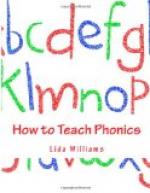Children mark these words and give reason: game, kite, make, coat, meat, wait.
After rules (1 to 3) are clearly developed, apply them by marking and pronouncing these words and giving reasons.
coat man neat he nine box sun feel kite she run me take we seam heat bit tan bite mad made take cape the mane cap lake
Rule 4.
When double consonants occur, the last is silent; tel_l_, bac_k_.
back bell kill dress duck Jack fell till Jess tack pack Nell fill less press lack Bell pill neck luck sack sell will Bess still tack tell hill block stick shall well mill peck trill shell yell rock clock struck
Rule 5.
T before ch is silent: ca_t_ch.
hatch switch ditch match stretch pitch latch thatch stitch patch sketch fetch hitch scratch match watch snatch crutch
Rule 6.
N before g, the sound of ng ([n=]): sing, also n before k—[n=]g,—i[n=]k.
bang song lank rang long bank sang strong sank hang thing tank wink cling sung sink swing lung think sing swung brink sting stung
Rule 7.
Initial k before n is silent—knife.
knee knew know knack knot knock knob knell knife knelt known kneel
Rule 8.
Initial w before r is silent—write.
wry wren written wring wreak wrist wrong wrote wriggle write wretch wrench wrap wreath writing
Rule 9.
Initial g before n is silent—gnaw.
gnat gnarl gnu gnaw gneiss gnome
Rule 10.
C before e, i or y is soft.—cent, city, cypress.
face cent nice lace cell price place ice slice race rice twice Grace mice cypress cylinder cyclone
(Hard c is found before a, o, and u or a consonant.)
Rule 11.
G before e, i or y is soft,—gentle, giant, gypsy. (Get and give are common exceptions.)
age gentle gem cage gin gypsy page gill giraffe rage ginger wage sage giant gipsy
Exercise—Pronounce and mark the following words, and tell whether they contain the soft or hard sounds of g.




